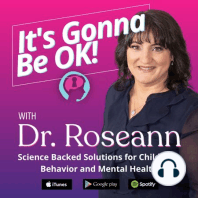15 min listen

154: Helping Children with Dysregulated Behavior
FromScience Backed Solutions for Children’s Behavior and Mental Health
154: Helping Children with Dysregulated Behavior
FromScience Backed Solutions for Children’s Behavior and Mental Health
ratings:
Length:
13 minutes
Released:
Jan 15, 2024
Format:
Podcast episode
Description
Dysregulation affects not just our children but also us parents as caregivers, impacting our own nervous systems. To address this challenge, it's essential to explore various forms of self-regulation which require consistent effort. That’s why I’m here to shed light on embarking on a journey to navigate the complexities of parenting children with dysregulated behavior. This may serve as a guide for parents, offering practical and actionable steps to promote positive behavioral changes, emotional well-being, and improved sensory and cognitive functioning.Dysregulated nervous systems and their impact on behavior.When faced with behavioral disinhibition and an inability to control responses, the impact on learning, attention, and overall well-being becomes evident. It is in these moments that the nervous system becomes dysregulated, hindering effective functioning. Being in a state of sympathetic dominance, often described as a "brain on fire"or experiencing a hyperactive limbic system, triggers a fight-flight-freeze response, putting everything, including healing, on hold. The term "brain on fire" emphasizes the intensity that individuals experience in this state, wherein the body is urged for immediate action in response to perceived threats.It's essential to recognize that this state of sympathetic dominance is not exclusive to extreme situations; it can manifest in individuals facing everyday stressors. This includes children dealing with conditions like OCD, anxiety, or mood disorders, and even seemingly composed individuals who, under the weight of heightened stress, may shift into this sympathetic dominant mode. It's crucial to recognize these patterns and address the dysregulation to pave the way for effective learning, emotional well-being, and overall growth.Parenting and self-regulation strategies.Understanding the five types of self-regulation and how children learn is crucial in understanding the dynamics of our children. Recognizing that everything is interconnected, we acknowledge that learning is not a one-dimensional process. Even if a child possesses an average IQ, which is common among 70% of the population, we have the power to teach and shape their behaviors positively.With respect to behavioral self-regulation, the most impactful step parents can take is modeling self-regulation although it may be challenging. By demonstrating the behavior we desire from our children, we significantly increase the likelihood of them adopting it. Instead of responding to our children's anger or anxiety with our own, it’s better to set a positive example for our children to reinforce desired behaviors.Shaping the behaviors we want is fundamental. Instead of inadvertently reinforcing undesirable behavior, we seek opportunities to commend and reinforce positive actions. For instance, if a child attempts to lower their voice, we express gratitude for their effort, fostering a constructive dialogue about their success.Investing time and effort upfront in these positive reinforcement strategies pays off by fostering a more pleasant and cooperative environment. This proactive approach reduces conflicts and arguments, facilitating the transition towards a space where children can self-regulate effectively.As for emotional self-regulation, it's crucial to validate their feelings without going overboard with comfort and without changing the family's entire routine when helping a child handle strong emotions or avoidant behavior. It's about acknowledging the difficulty without overcompensating. We're not encouraging or accommodating, but rather prompting the brain to recognize success. This way, we empower children to handle their emotions better and build a healthier emotional balance. Supporting children with sensory processing issues.Helping kids with social skills is easier with...
Released:
Jan 15, 2024
Format:
Podcast episode
Titles in the series (100)
05: What is Neurofeedback and How Does It Work? by Science Backed Solutions for Children’s Behavior and Mental Health